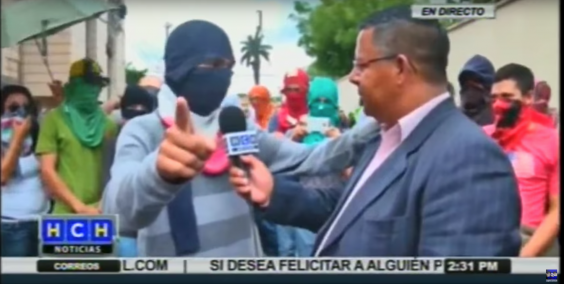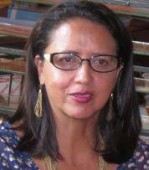From the Hooded Men of the State to the Hooded Men Dispossessed of their Rights
by Dina Meza Translated by Katherine Wingfield-Dobbs / July 11, 2016 / No comments

Student protesters from Universitarios de la UNAH, Honduars. Image via Youtube user: elcatracho C.A.
The showdown between student protesters and government officials at the National Autonomous University of Honduras is a microcosm of the human rights crisis in Honduras.
The phrase “hooded” is being used by the National Autonomous University of Honduras (Universidad Nacional Autónoma de Honduras), UNAH, as a pejorative term to refer to students who cover their faces in order to not to be recognized by the university authorities when they are demanding their rights.

- Honduras has one of the world’s highest murder rates. It is also one of the most dangerous countries to practice journalism, ranking 129th out of 180 in the 2014 World Press Freedom Index. Journalists are regularly threatened, attacked, and killed for their work. The Honduran government fails to punish those who use violence against reporters, essentially granting them impunity. This space will be dedicated to examining the lack of protection for Honduran journalists exercising their profession. Topics will include the use of state-sponsored advertising as a mechanism to reward or punish publications, and censorship and self-censorship as hindrances to democratic progress.

- Born in Cofradía, Honduras, Dina Meza has been recognized by PEN International, Amnesty International, Index on Censorship and Reporters without Borders for her work as a journalist and human rights advocate. Currently, Dina is the driving force behind the creation of Honduras PEN Centre. In 2013, she wrote “Reign of Terror,” an in-depth report on threats to Honduran journalists for Index on Censorship’s magazine. In 2014, she was named one of Reporters Without Borders’ “100 Heroes and Heroines of Information.”
But there are also other hooded people who arrive at the UNAH with total freedom. They are not asked to identify themselves nor have there been any criminal proceedings against them. They are the military, preventative, and investigative police who jump over the walls at the request of the authorities of that center of study.
To return to the word “hooded” with which they refer to the students, it is important to note that the hood is used by the repressive bodies of the State so they cannot be identified by the victims of violations of human rights.
As far as the students, they use the hood so that they are not victims of criminal proceedings, which has happened to those who did not cover their faces and who are facing trial for making use of social protest.
In spite of the fact that international treaties and conventions affirm that the State of Honduras must respect the right to freedom of expression, in practice that does not happen. Social protest as an element of freedom of expression is harmed every time any group demonstrates against state decisions.
The Inter-American Commission on Human Rights (IACHR) has indicated that “The right to demonstrate publicly is an essential element of freedom of expression. On many occasions, street protests, cuts to means of communication, or public meetings are the only available mechanisms for wide sectors of society who do not have or have very limited access to means of mass communication.”
Since 2010, the university students have been demanding that a process of dialogue be opened because the authorities have closed it down and have imposed authoritarianism.
It is important to emphasize that the UNAH is the country in miniature. All of the elements used by the central powers in Honduras can be found there: dismissal from work for human rights defenders; criminalization of social protest; closing down of spaces for freedom of expression; surveillance; harassment and monitoring of students.
I had a regrettable experience when I arrived at the Centro Universitario del Litoral Pacífico (CURLP). There, the teachers are closely monitored and any student movement is monitored. I arrived at the Center anonymously – I cannot relate the details of how I defeated the surveillance. I went in search of the testimony of a teacher whose vehicle’s nuts had been loosened merely for opposing the repressive actions of the authorities. That is daily life in that university center according to Héctor Martínez, a trade unionist from the Trade Union of the UNAH, who suffered attacks, surveillance, and threats due to his work as a human rights defender. In the end, he was killed by several gunshots and his crime remains unpunished.
Defending human rights in Honduras is a very risky business. One can face criminalization, defamation, and even jail.
Dozens of country people have been prosecuted; women suffer violence when they dare to file a lawsuit against the State of Honduras, and journalists have actions taken against them because they talk about thorny issues involving State officials.
The shocking thing is how the students have rationalized the phrase “hooded.” Their parents, siblings, and other family members have arrived at the UNAH with posters saying “Soy encapuchado porque te quiero pública UNAH” (“I am hooded because I want you to be public, UNAH”).
No-one wants to be in the shoes of those who use force to contain social protest; the major drawback in this case is that it ended the arguments. In the case of the UNAH, the various arguments used by the Rector Julieta Castellanos—which range from there being a political party behind the protest to the students being vandals—are getting out of hand.
The level at which they have handled the students who have written proposals to end the conflict at the UNAH shows Rector Castellanos – who is stubborn about authoritarianism and does not wear a hood – in a very bad light.
Unmasking this system of injustice established in the UNAH is dangerous, therefore it is justifiable that the students cover their faces. Society must demand an end to the hood that stifles students, on the one hand, but makes the students stronger, on the other.
The international community must realize that although the Rector tries to appear as a very fair person publicly, she carries out repression within the university she directs. There will definitely not be a hood that is worth wearing because the truth will come out, unmasked and unhooded.




